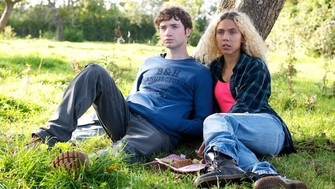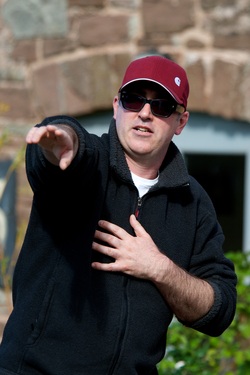
A crucial part of cinema will always be the coming of age drama. The movies themselves help cradle the youth (and sometimes the adults) into an emotional curve that develops their own voices as the characters transcend the screen and into our minds. Lisle Turner, a fantastic short-film director, gives us a fresh story of growth and development with his debut feature film: Here and Now. Starring Andy Rush and Lauren Johns, the movie revolves around Grace, a chatty teenager who is uprooted from her city lifestyle by her parents for a holiday in the countryside. When she meets Say, a silent brooding boy, she soon starts to understand the importance of the world around and together they grow.
Fresh from its premiere at the East End Film Festival, Here and Now opens in cinemas nationwide tomorrow. In a small office, set against the backdrop of a lazy summers afternoon in Soho, director Lisle Turner, actor Andy Rush and producer Martina Klich are pummelling through a day of publicity and singing auditions. There is a buzz of excitement from the talent, sandwiched on the sofas, to indulge in conversation with I’m With Geek.

Whilst coming of age dramas may be two-a-penny for indie flicks, Turner is keen and passionate about his story, owing his inspiration to three things. “After living in London for many years, I decided to move to the countryside. Around this time, I also became a father and I was thinking about my own struggles as a parent, similar to the stuff Grace is going through. It also made me think of the death of my own father and the issues in my life. Coming of age stories are a way for dealing with it because you can explore your own feelings with the characters because it is new for them and new for yourself.”
At the core of Here and Now is the death of Say’s father, causing him to pull back and be more reclusive at the beginning of the film. The pivotal arc of the story is the exploration of his grief and it is clearly an important factor in Lisle’s development of the story. Asking whether or not this could help a younger audience cope with their own losses, Turner sits back, contemplating (and complimenting the character) pausing to answer it with justice. “Say’s character deals with the death of his father in a very pragmatic way. He has an understanding that everything changes, you’ll lose people who you love. It’s how you choose to deal with it that matters. Here, he chooses to deal with it in a positive way and not explode with the anguish. Grace helps him do that, so I hope the film helps people cope.”
Andy Rush, who has been quite silent to this point (he has a singing class in a few hours, so perhaps he is conserving his voice) is the key for Say to, no pun intended, find his voice. “It’s a pleasure to do it. I really identified with Say as I can be philosophical at times. The journey he goes on is important, especially to showcase how people deal with grief and relationships. It’s Grace that brings him out, psychologically as well and it’s her that brings him out of his shell. She learns to be more thoughtful too. They both evolves with this relationship.
Part of Say’s character is his removal from others, finding solace in silence. Though keeping pretty shtum in the interview, Rush must have encountered difficulties playing the role near mute. “I am a massive fan of Chaplin and Keaton.” He says about Say’s hesitation finding his own voice. “Ok, so this wasn’t slapstick comedy, but I love silent movie stars. What helped me was Lauren, I could react off her lines. I can relate to the stoicness though. The less said the better; strong and silent. People always think there is more going on that way."
Lisle jokingly adds, “he is a very deep man.”
 Lisle directing the team on set
Lisle directing the team on set “It was great to be given that opportunity, for Lauren as well,” Andy says, reminiscing on the shoot and development of the film. “We both enjoyed that opportunity, it was a really good learning curve because we had to do it all in three weeks. Any qualms or apprehension were gone as you had to jump in feet first…”
“... into a river,” finishes Turner, laughing at orchestrating the actors to plunge into a cold English river. “They were willing to do it. They were in a river, up a mountain, in a tree house and had passion to do it again and again. We all had fun.”
“It was certainly invigorating,” says Rush, laughing.
As is the tone with a lot of movies nowadays is to object to the over saturation of technology. In the hub of London, where this interview is taking place, it’s not hard to find suits and teens' noses tipped on a screen. Here and Now addresses the divide between the city and the country. Turner is aware of the combination and the comment, “I think there’s a juxtaposition. If you change your environment, you’ll be open to the possibility. I love them both, it’s about balancing it and Grace is altered when she goes to the city, as Say would be going to the city.”
This immediately begs the question of a sequel that Andy Rush is keen to head, “I want to do a Kickstarter called There and Then, where Say does go to the City and gets involved in a bank heist. It’s a real gritty crime drama and caper.”
Whilst the room erupts into laughter at the thought of Say, silent but deadly, holding a Lloyds up at gunpoint, the tone shifts again to Turner’s spiritual influence of Buddhism that he happily talks about on his website. “I’ve been studying the teachings of the Buddha for seventeen years now. It’s about impermanence, how nothing in life lasts forever. Ultimately, it will make you unhappy if you hold onto things. You have to accept the good and bad, it’s a fact that Grace learns in the movie.”

Whilst the main focus of Here and Now is on Say and Grace’s relationship, beneath that is their adult counterparts. Grace’s parents are falling apart as she is falling in love. Say’s mother is struggling with the loss of her husband as Say is coping too. The challenge for Turner was making all stories entwine perfectly. “First and foremost, it is a coming of age drama. It needs time and space as it is delicate. I didn’t want too much detail with the subplots but no one lives in a vacuum. I wanted to use it to enhance their story. It’s important to convey that the love story does help them. They see their kids come together as they are falling apart.” Turner enthuses, “The young can do well to learn from the old, but also the old can look to the young, as well.”
The young stars have a courageous spark of chemistry on screen and clearly, from her presence in the answers, Lauren Johns has impacted the team, too. With Johns and Rush having to develop on an initial attraction to their emotional arcs, there must have been an instantaneous friendship growing from the pair of actors. “It helps that it was an intense shoot,” Rush says, ruminating on Johns. “We shared a small flat during film too, so we were under each other’s feet and annoying one another. The development happened between us as well as the characters because it had to and we just gelled”
Out tomorrow, Here and Now boasts a picturesque cinematography, astonishing iconic scenes, a beautiful love story and promising young actors. Falling on the independent side, it is vital to get audiences flocking to this great film. If the team had three words about the movie what would it be?
“If you can’t make it at the – oh wait, that’s more than three words, I’ve already failed,” stumbled Klich who eventually reminds us that you can also catch it on: “Google, Amazon Instant and iTunes.”
Turner delegates the answer to Andy while he thinks about it, leaning back in the sofa and staring at the ceiling of answers. Rush, almost describing himself, says “strong and silent.”
Finally, in an impeccable tagline, Turner leaps from his position and says,
“love, loss and beauty.”
Catch Here and Now tomorrow! To find out more, head to their film page here or Facebookhere. Read Cookie N Screens review on the film now!

 RSS Feed
RSS Feed
